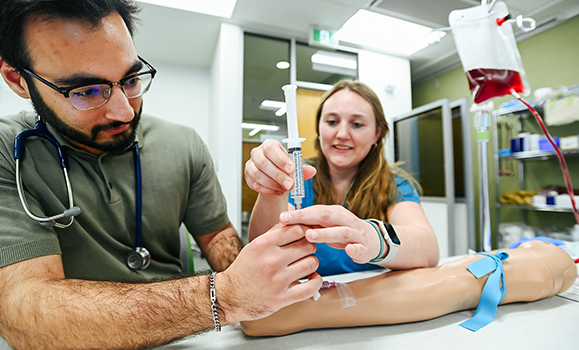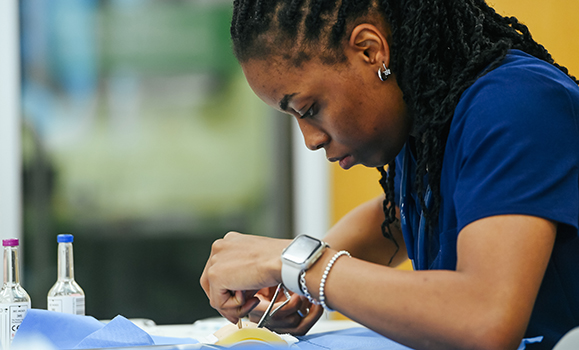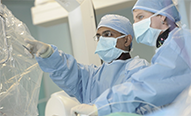Before donning scrubs and stepping into operating rooms, Heather Chigora worked as a pharmacy assistant, helping to ensure smooth operations and high-quality patient care.Ã˝
It was through her close work with pharmacists, nurses, and physicians in that role that she developed an interest in the possibilities of becoming a physician assistant (PA).Ã˝Ã˝
‚ÄúThat position gave me firsthand insight into how important accessible, team-based care is, and I often found myself wanting to do more for patients beyond the counter,‚Äù says Heather, who began her studies in the inaugural cohort for Dal'sÃ˝Ã˝(MPAS) program in January 2024.
‚ÄúIt opened my eyes to the PA role, and once I realized it combined medical decision-making with a strong patient focus and flexibility across specialties, it really clicked for me.‚ÄùÃ˝
The first of its kind in the Maritime provinces, the MPAS provides graduates with the competencies needed to provide compassionate, evidence-based care and significantly contribute to interprofessional health-care teams, offering some relief in an overburdened system.Ã˝ Ã˝ Ã˝Ã˝
Physician assistants are medically trained professionals who work alongside physicians and other health-care providers to deliver high-quality, team-based care. ƒ¢πΩAV‚Äôs MPAS program offers a rigorous two-year curriculum that prepares students for clinical practice through intensive training in diagnosis, treatment planning, pharmacology, and surgical procedures.Ã˝Ã˝
Ã˝
Ã˝
Ã˝
Ã˝
Ã˝
Explore more professional master's programs
Explore the MPAS program and theÃ˝30+ professional master‚Äôs programsÃ˝offered at ƒ¢πΩAV.
‚ÄúI am quite proud of the job our MPAS faculty and administration team has done to launch this program,‚Äù says , assistant dean of physician assistant studies at Dal. ‚ÄúIt is very satisfying to see the growth of our students, and I believe they will make a difference in the delivery of health care to our community.‚ÄùÃ˝ Ã˝
Learning across the province
A key strength of the program is its focus on hands-on learning through clinical rotations. From primary care to emergency departments, students apply their skills directly with patients in real-world environments under the supervision of experienced physicians and PAs, gaining broad exposure and preparing them for the diverse challenges of modern health care.Ã˝

MPAS student Diwan Minocha of Amherst, shown above, was drawn to the flexibility and scope of the PA profession, the two-year training program, and the opportunity to be part of a new wave of health-care delivery in his home province.Ã˝Ã˝
‚ÄúIn the spring, I completed an internal medicine rotation at the Colchester Hospital,‚Äù says Diwan. ‚ÄúIt‚Äôs a catch-all rotation where I was exposed to all kinds of medicine, and everyone was extremely welcoming.‚ÄùÃ˝Ã˝
Diwan has also completed clinical rotations in pediatrics, obstetrics and gynaecology, family medicine, psychiatry, and endocrinology, gaining experience in specialized clinics, inpatient units, and operating rooms across the province.Ã˝
Research and experience consistently show that when students live and train in communities, especially rural or underserved areas, they‚Äôre more likely to return and practice there after graduation.Ã˝Ã˝
‚ÄúOur students have been welcomed into clinical settings and have participated in several interprofessional education experiences with allied health and medical students,‚Äù says Dr. Clory. ‚ÄúFeedback from clinical preceptors has been extremely positive, with preceptors from various medical disciplines expressing interest in adding PAs to their care teams.‚ÄùÃ˝
A piece of the puzzle
Before enrolling in the MPAS program, Jen Haskett spent nearly 20 years as a clinical dietitian at the IWK Health Centre. Seeking to play a more active role in treatment, the physician assistant path was a natural next step for her.Ã˝
Jen‚Äôs history in the sector and navigating her own chronic illness mean she has experienced some of the challenges of Nova Scotia‚Äôs overburdened system first-hand.Ã˝
‚ÄúI was excited at the prospect of being part of the solution, or at least one piece of that puzzle,‚Äù she says.Ã˝Ã˝
I was excited at the prospect of being part of the solution, or at least one piece of that puzzle.
Jen, now nearly a year into the program, is looking ahead to clerkship, which will take her to two different hospitals and a rural family medicine placement in Annapolis County. Though the program is still evolving, she feels reassured by how faculty have responded to feedback from current clerkship students to strengthen the learning experience.Ã˝
Students acknowledge that the transition from classroom to clinic hasn‚Äôt been without its challenges. Some have encountered logistical hurdles and moments of uncertainty.Ã˝Ã˝
‚ÄúIt was a steep learning curve not only in terms of medical information, but also in terms of how a PA program should run,‚Äù reflects Diwan. ‚ÄúThe goal for a lot of students in my class was to try to make effective change in the program so that future classes would have smooth transitions and be able to focus their attention on learning how to be a good PA.‚ÄùÃ˝
Resilient, ready, essential
Despite these growing pains, students report overwhelmingly positive responses from both patients and health-care teams.Ã˝Ã˝
Daniel Reyly, a practicing physician assistant since 2008, has been actively involved with the MPAS program as an advisor on class panels, a preceptor for students in the emergency department, and part of Nova Scotia Health‚Äôs Interprofessional Practice and Leadership team. He says members of the inaugural class have demonstrated remarkable resilience, professionalism, and capability.Ã˝
‚ÄúAs a cohort, they are proving themselves to be highly competent future providers, and I believe they will be an excellent addition to the health-care system. Their contributions will undoubtedly benefit patients, colleagues, and the broader community.‚ÄùÃ˝

Heather Chigora.Ã˝
While the PA role still draws curiosity from some patients, most are supportive once it‚Äôs explained and many providers, like Daniel, are eager to help students learn, recognizing the value PAs bring to improving access and continuity of care.Ã˝
As the inaugural cohort of ƒ¢πΩAV‚Äôs MPAS program prepares to graduate this December, their journey marks a transformative moment for health care in Nova Scotia.Ã˝Ã˝
“PAs are a growing and essential part of Canada’s health-care landscape and the profession is only going to become more important in the years to come” says Heather. “My experience in the program has confirmed that this is not only a rewarding career path but also a vital one.”


